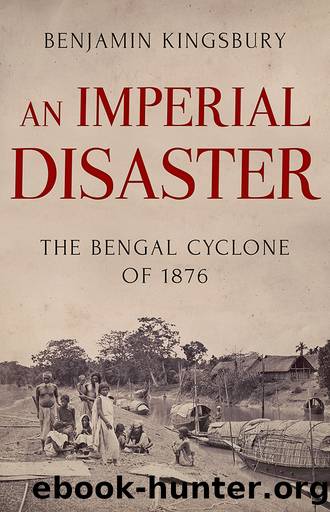An Imperial Disaster: The Bengal Cyclone of 1876 by Benjamin Kingsbury

Author:Benjamin Kingsbury [Kingsbury, Benjamin]
Language: eng
Format: epub
Tags: history, Asia, India & South Asia, Modern, 19th Century, Historical Geography
ISBN: 9780190050252
Google: 3_pyDwAAQBAJ
Publisher: Oxford University Press
Published: 2018-10-15T00:31:24.767551+00:00
By the 1870s Bengal had a vigorous Bengali-owned press, with papers in English as well as the Bengali vernacular. These papers professed loyalty to the Crown, but were often severe in their criticisms of the government. Their reportage and commentary on the cyclone offers a useful counter-balance to the official version of events.
The first news of the disaster reached the Calcutta papers on 6 November: Peacockâs telegram had arrived earlier that day from Dacca. The response from The Bengalee, a paper of the Bengali gentry, was one of anxiety for both the survivors of the cyclone and the residents of the metropolis. âBackergunge is the great rice Golah [granary] of Calcutta,â it wrote, âand any great calamity there cannot but affect us materially.â The paper thought there hadnât been such a terrible disaster in Bengal since the famine of 1770. Relief in large quantities would have to be provided by the government, the landlords, and âfellow countrymen in affluent circumstancesââthe readers of The Bengalee. If it wasnât forthcoming, the paper added, disease would be sure to follow.
Debate in the Bengali papers of late 1876 was dominated by two topics. One was the forthcoming imperial durbar at Delhi, at which Queen Victoria would be proclaimed empress of India. The other was the famine underway in southern and western India. The coincidence of these two events had already led the papers to question the governmentâs financial priorities. Now the cyclone was brought onto the stage too. âBengal is in no mood for mirthâ, The Bengalee wrote. âShe has lost by the storm-wave of the 31st ultimo in all likelihood about several hundred thousands of her children ⦠The Deccan is being desolated by a widespread famine, the full magnitude of which is not yet known. And yet our rulers are about to proclaim with the sound of trumpets an addition to the royal title which no one in particular is fond of.â The great expense of the durbar was coming at a time when the governmentâs finances were, by its own admission, not in good shape. âIn the present position of the Exchequer, it is not pleasant to think of half a million sterling being wasted on an approaching state pageant.â
The tone of the criticisms became more aggressive as it became clear that they were being ignored. In a neat inversion of the justification for the durbarâthat Indians were incapable of understanding power without spectacleâThe Bengalee described the event as a product of Disraeliâs âoriental imaginationâ. If it took place while the country was in the grip of a famine, and had just suffered the worst cyclone disaster in recorded history, it would leave âa very unpleasant impressionâ. âWhat is necessary for the Government to prove at this moment is that it thinks more of the welfare of its subjects than of personal displays of power and magnificence. The financial position of the country is such that it can hardly bear the expenses of a tamasha [grand show], while millions stand in sad need of pecuniary help.
Download
This site does not store any files on its server. We only index and link to content provided by other sites. Please contact the content providers to delete copyright contents if any and email us, we'll remove relevant links or contents immediately.
| Africa | Americas |
| Arctic & Antarctica | Asia |
| Australia & Oceania | Europe |
| Middle East | Russia |
| United States | World |
| Ancient Civilizations | Military |
| Historical Study & Educational Resources |
Machine Learning at Scale with H2O by Gregory Keys | David Whiting(4296)
Never by Ken Follett(3938)
Fairy Tale by Stephen King(3372)
Oathbringer (The Stormlight Archive, Book 3) by Brandon Sanderson(3165)
The Man Who Died Twice by Richard Osman(3073)
Will by Will Smith(2912)
Rationality by Steven Pinker(2352)
Can't Hurt Me: Master Your Mind and Defy the Odds - Clean Edition by David Goggins(2325)
The Dark Hours by Michael Connelly(2300)
Friends, Lovers, and the Big Terrible Thing by Matthew Perry(2220)
The Dawn of Everything: A New History of Humanity by David Graeber & David Wengrow(2197)
Principles for Dealing With the Changing World Order: Why Nations Succeed and Fail by Ray Dalio(2044)
A Short History of War by Jeremy Black(1843)
HBR's 10 Must Reads 2022 by Harvard Business Review(1840)
Go Tell the Bees That I Am Gone by Diana Gabaldon(1754)
A Game of Thrones (The Illustrated Edition) by George R. R. Martin(1728)
Kingdom of Ash by Maas Sarah J(1668)
515945210 by Unknown(1663)
443319537 by Unknown(1546)
